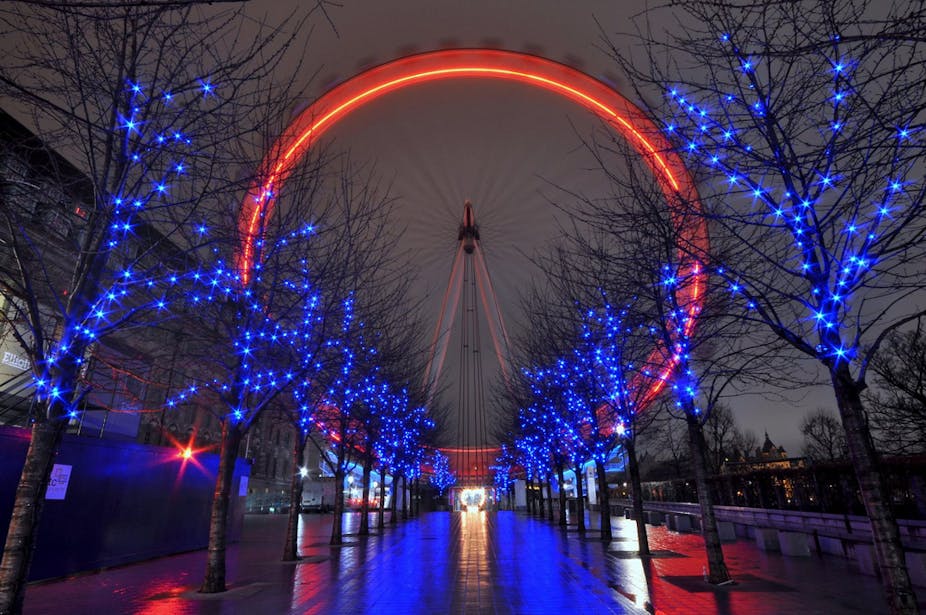When it was announced last year that Coca-Cola had agreed a two-year sponsorship deal with the owners of the London Eye, the general manager of the company’s UK and Ireland operations said the sponsorship would “help us play an even greater part in future moments of happiness and celebration in the capital”.
But just as with the furore over fast food sponsorships of the London Olympics in 2012, not everyone is celebrating. On Saturday Malcolm Clark, coordinator of the Children’s Food Campaign led a group of volunteers in handing out toothbrushes to children and parents queueing up for their ride on the London Eye. This was an effort to publicise the perceived inappropriateness of the global soft drinks company sponsoring such a major tourist attraction.
What does the sponsorship mean in reality? Each pod will now be branded with Coca-Cola and staff will wear red tops with the brand name on the back while security staff will wear Coca-Cola hats and all the cafes in the ticket office are similarly branded. But perhaps most significant is that the wheel will now shine Coca-Cola red at night.
Sugaring the pill
The Children’s Food Campaign is against Coca-Cola in principle. It is canvassing for a tax on sugary drinks and a ban on junk food advertising before 9.00pm. But do Malcolm Clark and his supporters have a point regarding the appropriateness of Coca-Cola taking over the sponsorship at this time in the nation’s struggle with obesity, diabetes and poor dental health?

Of course there is one argument to say parents should be responsible for controlling what their children consume and that Coke is just another choice. Another argument says that whoever took on the sponsorship, there would be the potential for controversy; as one parent is reported to have pointed out, those who are concerned with climate change may have disapproved of EDF and British Airways, previous sponsors of the wheel.
But Coca-Cola is different. It is a worldwide consumer brand high in sugar that is currently carefully managing its role in the obesity debate. The company’s mantra has been that Coca-Cola should be enjoyed as part of a balanced diet – which is fine except that we know people have a problem balancing their diets. It is a signatory to the much-vaunted and criticised responsibility deal with government wherein it has committed to reducing the calories in its drinks and has (finally) adopted traffic light labelling. The company has recently launched Coke Life with 89 calories compared to the standard Coke’s 139, and has developed other measures including selling coke in smaller cans.
But these actions have all been taken alongside the company’s existing brands. You can still buy fully sugared coke in large bottle and cans. A cynic might say that Coca-Cola is looking for every opportunity to continue to market its brand while developing initiatives that will take the heat off it in the obesity debate. This is a clever strategy of appropriate product development while ensuring that their name is in front of consumers young and old, whatever version of the brand they choose to drink.

This company has survived since the 19th century because it has adapted and responded to market situations. It could be described an original “me-too product” – Coca-Cola investor John Pemberton started out with “French Wine Coca” which was inspired by successful tonic wine “Vin Mariani” in its product composition. When the southern states of America became more temperance-minded the firm’s founder John Pemberton quickly replaced the wine with carbonated water.
War footing
Coca-Cola wasn’t above making the most of a market opportunity during World War II. The company presented itself as a dedicated public citizen committed to the war effort, bringing much needed energy to a nation weary from the exertions of the war, while patriotically selling sugar at below market price to the US military. Actions such as this led to exclusive contracts with US military across the globe, excluding its major rival Pepsi and resulting in control of 95% of all military soft drink sales. It was Coke’s successful war that was the foundation for its global expansion.
Coca-Cola is a company that produces a simple product (albeit one with a secret recipe) but whose success has been largely achieved through a plethora of canny business decisions that have kept the product in front of the consumer around the globe.
The sponsorship of the London Eye is just the latest in a long line of examples of smart positioning, and it means organisations like the Children’s Food Campaign will have their work cut out to remove the ubiquitous brand from Britain’s not-so-balanced diet.

